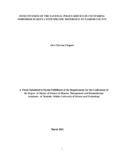| dc.description.abstract | Terrorism remains a major threat to national, regional and global peace and security. It has become a central and controversial issue of global attention. International consensus is growing on the best way to counter-terrorism. In Kenya, the effectiveness of the National Police Service (NPS) in countering terrorism significantly increased when Al-Qaeda bombed the United States of America (USA) Embassy in August 1998. This led to the formation of the National Intelligence Service (NIS) and Kenya was added to the United States Anti-Terrorism Assistance Program (USATAP). The overall objective of the study was to assess the effectiveness of the National Police Service in countering terrorism in Kenya with specific reference to Nairobi County. The objectives of the study were to assess the nature and extent of terrorism in Kenya; to examine the contribution of the NPS in managing terrorism; and, to establish the challenges the NPS faces in its counter-terrorism efforts in Kenya. The study was guided by three theories; rational theory of choice, which explained why people choose terrorism; the utilitarianism theory that dealt with the ethical issues brought out by rational choice; and, the theory of bureaucratization, which explained the organizational performance of the NPS. The study employed a descriptive survey research design. The study sites were police stations within Nairobi County. The sample size for the study was 311. The sample was selected through three sampling techniques: systematic random probability sampling to identify the police officers‟ sample; purposive non-probability technique to select key informants and snowballing sampling to identify the terrorism survivors. Data collection tools were: semi-structured questionnaires for police officers; and, interview guides for survivors of terrorism attack, senior state officers in the Ministry of Interior and Coordination of National Government and members of CSOs. Data analysis employed descriptive statistics using both qualitative and quantitative techniques. Quantitative data were analyzed using the Statistical Package for Social Sciences (SPSS) version 24.0. Quantitative data were presented in tables and qualitative data discussed thematically in line with the study objectives. The study established that the NPS acts as both a deterrent and reactive force to terrorism by deterring the planning of attacks on the Kenyan soil though they face numerous challenges in discharging their mandates. The study concluded that NPS contribution to counter-terrorism has led to a decline in terrorism by utilizing the law enforcement and intelligence entities that are already in place to mitigate terrorism threats. The study recommends that the government should equip and train adequate NPS for effectiveness in counter-terrorism. The study findings are significant to the NPS because they provide information that could inform the current policy on her role in counter-terrorism. | en_US |

